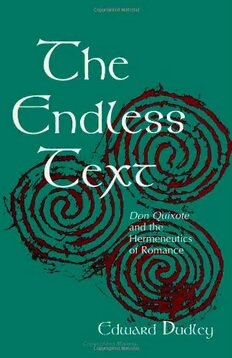
The Endless Text: Don Quixote and the Hermeneutics of Romance PDF
342 Pages·1997·1.732 MB·English
Most books are stored in the elastic cloud where traffic is expensive. For this reason, we have a limit on daily download.
Preview The Endless Text: Don Quixote and the Hermeneutics of Romance
Description:
The Endless Text is the first study to trace the history of chivalric fiction in Western Europe, from the earliest Celtic tales to the conflict between romance and realism in Don Quixote. A set of specific rhetorical devices are traced through the development of medieval romance in the works of Chretien de Troyes, and a surprising number of these devices survive in Don Quixote: the troubled relationship between narrator and hero, the consistent image of the hero in contrast to the fluctuating portrayals of women, and the ways in which problems of retelling the story become part of the story itself. An integral part of this rhetorical migration was the unstable referential value of the lexicon: for example, fish platters became holy chalices, and gods became heroes while goddesses and Otherworld women became evil enchantresses. It was this linguistic revolution that created the "hermeneutics of romance" and forced readers to interpret the unstable signs embedded in the text. Fear of how this played out in the reader's consciousness was the basis for the condemnation of romance by church and state. Ultimately, this critical approach provides a new formula for rereading Don Quixote, one that reinterprets the questions of what makes or unmakes a hero, what is free will in relation to destiny, and how the language of women differs from that of men.
See more
The list of books you might like
Most books are stored in the elastic cloud where traffic is expensive. For this reason, we have a limit on daily download.
